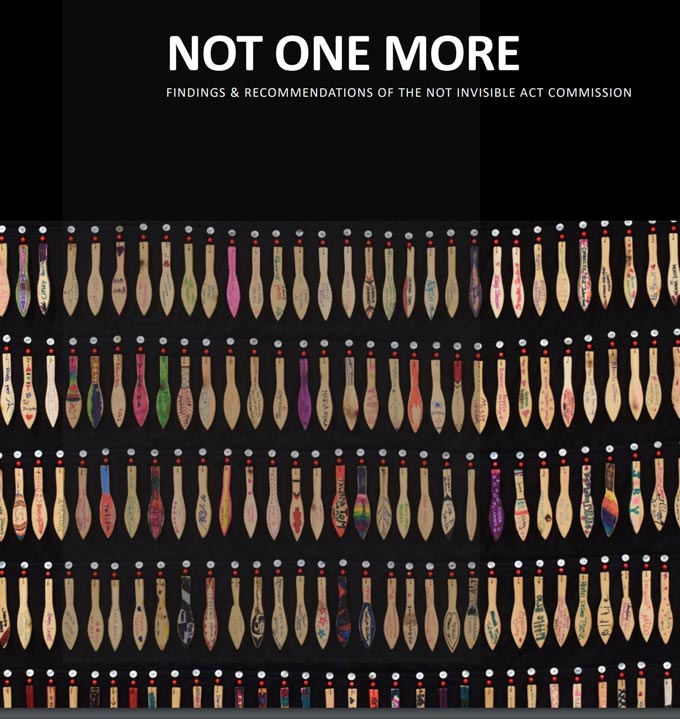November 17, 2024 - WASHINGTON – The U.S. Department of Health and Human Services (HHS) is committed to protecting the public safety and well-being of American Indian, Alaska Native, Native Hawaiian, and Pacific Islander people and communities by addressing the recommendations of the Not Invisible Act Commission. The Not Invisible Act Commission is a cross jurisdictional advisory committee composed of law enforcement, Tribal leaders, federal partners, service providers, family members of missing and murdered individuals, and survivors. The Commission developed recommendations to address public safety challenges identified in the Act.
Last Friday, in its response to the findings and recommendations - PDF of the Not Invisible Act Commission (NIAC), HHS reaffirms its commitment to address the ongoing crises of missing and murdered Indigenous peoples (MMIP) and human trafficking by elevating its social and health care services tied to the prevention, intervention, and healing from violence and trauma.
“HHS remains committed to providing quality and culturally-appropriate health care, in all forms, to the citizens of Tribal nations and continues to be fully invested in the mental and physical well-being of Indian Country,” said HHS Secretary Xavier Becerra. “Under President Biden’s leadership, HHS has worked to partner with Tribes to meet the federal government’s obligations and build stronger and more resilient relationships. HHS is honored to have served on the NIAC and we are committed to furthering the recommendations as laid out by the commission’s report.”
NIAC included representatives from three HHS agencies: Patrice H. Kunesh, the deputy assistant secretary for Native Affairs-Administration for Children and Families (ACF), the commissioner for the Administration for Native Americans within ACF, and the chair of the HHS Intradepartmental Council on Native American Affairs (ICNAA) and a descendant of the Standing Rock Sioux Tribe; Joshuah Marshall, Indian Health Service (IHS), senior advisor to the Director and a member of Northern Arapaho Tribe; and Captain Karen Hearod, director of the Office of Tribal Affairs and Policy, Substance Abuse and Mental Health Services Administration (SAMHSA) and a member of the Choctaw Nation of Oklahoma.
“It was my utmost honor to serve on the NIAC, to hear the lived experiences of family members of missing and trafficked persons and to be part of a national effort to bring to light the extent of tragedy and trauma experienced by Native peoples and communities,” said Patrice H. Kunesh. “I was profoundly and personally moved by this experience. I applaud the Biden Harris administration’s leadership in prioritizing the concerns of tribal leaders and believe HHS is now better informed and equipped to fully address the chronic crises of MMIP and human trafficking in Indian Country. NIAC has been pivotal in shaping a whole-of-government response to the crises. HHS collaborates with the Departments of the Interior and Justice on initiatives to prevent violence and human trafficking through community-driven and culturally sensitive approaches, including trauma-informed care services. HHS provides comprehensive, culturally appropriate care across Native communities, including frontline health services through the IHS and behavioral health support via SAMHSA.
“By coming together in this way, through collaboration and engagement with those so deeply impacted, we can move forward to advance the strategies needed to end the crisis of MMIP and human trafficking and commence healing,” said Karen Hearod, Director of SAMHSA’s Office of Tribal Affairs and Policy. “Understanding and supporting the continuum of care, from prevention to access to comprehensive and culturally appropriate mental health and substance use disorder services, we will continue to strengthen and improve how we work with Tribes to achieve these goals.”
Within the HHS Supplemental Response - PDF, the department outlines how it’s services to human trafficking survivors align with the report recommendations, supports improving data collection on MMIP and human trafficking, as well as uplifts resources available to Tribes and organizations for violence prevention and healing.
Importantly, HHS also will improve cooperation with Tribal communities to provide culturally appropriate services and resources, provide training and capacity building to improve services, and seek additional grant funding to expand community-driven efforts to develop data collection systems.
“The Indian Health Service fully recognizes that the report and recommendations are a direct result of the courageous testimonies of survivors of violence and human trafficking as well as the families and communities of those lost to the MMIP crisis,” said IHS Senior Advisor to the Director Joshuah Marshall. “Honoring their contribution to ending the crisis facing our people is an absolute priority of this administration.”
Source: HHS









